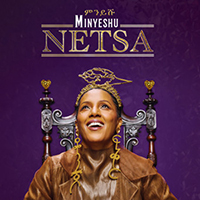Minyeshu - Netsa
 Ook voor Minyeshu werd de COVID-19 pandemie en de daaraan verbonden restricties vooral een periode van zelfreflectie, maar toch bleek muziek telkens weer het antwoord te bieden en het resultaat is Netsa.
Ook voor Minyeshu werd de COVID-19 pandemie en de daaraan verbonden restricties vooral een periode van zelfreflectie, maar toch bleek muziek telkens weer het antwoord te bieden en het resultaat is Netsa. Minyeshu: "It became clear that music is a part of me, I breathe music, I Dream music, and of course looking back it has always been a part of me. Music is what sets me free, which is why 'Netsa', meaning "free" in Amharic, was the perfect project for me. It was a chance to have the time to experiment, to exploreÖ To be free! The album also highlights how we should see the world with positivity. The sun is still shining and nature is still nourishing us. People are still free and able to reach out and connect with each other with their hearts, minds and souls, even if physically or geographically they might be distanced.".
In opener Fidel (Amhaars voor "het alfabet"), een nummer waarin Minyeshu mijmert over de simpele kinderspelen die ze zich herinnert uit haar kinderdagen in EthiopiŽ en die langzaam maar zeker aan het verdwijnen zijn, horen we in de intro het geluid van dinka-hoorns, tot wel vijf meter lange instrumenten uit bamboe en dierenhoorn die enkel bij de Dawro of Dawuro uit zuidelijk EthiopiŽ terug te vinden zijn. Minyeshu: "You don't see these basic games being played anymore. My daughter, for example, is half Dutch, so she missed out on experiencing childhood like this, so I like to sing about these memories to keep them alive.".
Het tempo gaat omlaag voor Qulef ("de sleutel"), een intieme jazzy ode aan liefde en verbondenheid: "When you lock something with a key, there is an element of unity, both parts are locked together as one. Likewise, when you have a house, it is built from seperate parts which are then locked together, eventually forming a home.".
Voor Yene Africa ("mijn Afrika") werkte Minyeshu samen met de Zuid-Afrikaanse vrouwenband Afrika Mamas (die ook te horen zijn in Qhakaza Thando (Zoeloe voor "liefdesbloesems"), waarin Minyeshu de typisch Ethiopische tezeta of nostalgie laat botsen met de Zoeloe-vocalen van de dames en een reggaeritme).
In het naar een klassieke wals neigende Fiker heeft de zangeres het dan weer over onvoorwaardelijke liefde: "For me, there are three things that come to mind when I think of unconditional love: my country, Ethiopia, my mother and my daughter. Those three form who I am today. Your birthplace, your culture, your upbringingÖ they are all foundation stones. Your mother is the person who raised you, so of course she also helps form who you are. And your children can change you, as you adapt to a new way of life becoming a parent yourself.".
In nummers als Ethio Yo Yo Pia, Abay (Amhaars voor "Blauwe Nijl") of het funky Erta Ale (een vulkaan in het noordoosten van EthiopiŽ) bezingt Minyeshu de schoonheid en kracht van de natuur: "Ethiopia is my heritage; my roots are still a big part of me, wherever I go. 'Abay', the Blue Nile, is like a person to me because it's so powerful. During the last couple of years, I have gone deep within myself and connected with the universe on another level. I really love the volcano Erta Ale, which is in the North East of Ethiopia, and dream of walking it barefoot one day!".
Minyeshu besluit met Getee ("mijn juweel"), waarin ze net zoals in Qulef een voorwerp als symbool gebruikt: "With a cherished piece of jewellery, like a wedding ring, you don't just take it off one day and replace it with another. It is too important; it means too much. This song is for my other half - the love of my life - who makes me feel proud and special. He is my crown jewel!". Met 'Netsa' paart Minyeshu opnieuw op een aanstekende wijze Ethiopische traditie met moderne invloeden.
www.minyeshu.nl | www.arcmusic.co.uk